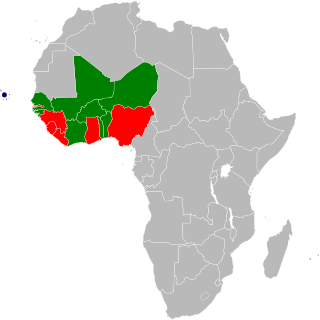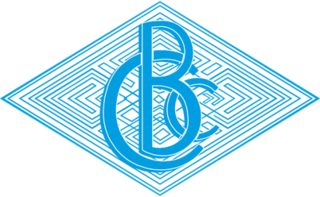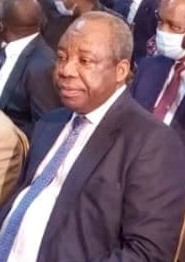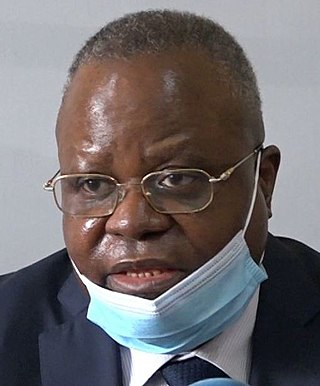
The CFA franc is the name of two currencies used by 210 million people in fourteen African countries:the West African CFA franc,used in eight West African countries,and the Central African CFA franc,used in six Central African countries. The ISO currency codes are XAF for the Central African CFA franc and XOF for the West African CFA franc. Although the two currencies are commonly called the CFA franc and (currently) have the same value,they are not interchangeable. It is therefore not a common monetary zone but two juxtaposed zones.

Denis Sassou Nguesso is a Congolese politician and former military officer who became president of the Republic of the Congo in 1997. He served a previous term as president from 1979 to 1992.
Mbuyamu Ilankir "Freddy" Matungulu (born January 4,1955 Belgian Congo is a Congolese economist. He was Minister of Finance of the Democratic Republic of the Congo from 2001 to 2003.

The West African Economic and Monetary Union,generally referred in English to by its French acronym UEMOA and alternatively as WAEMU,is an treaty-based arrangement binding together eight West African states within the larger Economic Community of West African States,seven of which were previously colonies of French West Africa. It was established to promote monetary and financial stability as well as economic integration among countries that share the West African CFA franc as a common currency. From 1962 to 1994,it was known as the West African Monetary Union.
The Economic and Monetary Community of Central Africa,generally referred to by its French acronym CEMAC,is an organization of states of Central Africa established by Cameroon,Central African Republic,Chad,the Republic of the Congo,Equatorial Guinea and Gabon to promote economic integration among countries that share a common currency,the Central African CFA franc.

The Central African CFA franc is the currency of six independent states in Central Africa:Cameroon,Central African Republic,Chad,Republic of the Congo,Equatorial Guinea and Gabon. These six countries had a combined population of 55.2 million in 2020,and a combined GDP of over US$100 billion.

The Bank of Central African States is a central bank that serves six central African countries which form the Economic and Monetary Community of Central Africa:Cameroon,Central African Republic,Chad,Equatorial Guinea,Gabon,and the Republic of the Congo.

The Central Bank of West African States is a central bank serving the eight west African countries which share the common West African CFA franc currency and comprise the West African Economic and Monetary Union.

The Central Bank of the Congo,colloquially known by its acronym BCC,is the central bank of the Democratic Republic of the Congo. Its headquarters are located on Boulevard Colonel Tshatshi in Gombe,Kinshasa,surrounded by significant institutions including the Palais de la Nation,the National Library,and several government ministries.

Pierre Moussa is a Congolese politician who has been President of the Commission of the Economic and Monetary Community of Central Africa since 2012. He served in the government of Congo-Brazzaville as Minister of Planning from 1979 to 1991;later,he was Minister of Spatial Planning from 1997 to 2002,Minister of Planning from 2002 to 2009,and Minister of State for the Economy and Planning from 2009 to 2012.
Pacifique Issoïbeka is a Congolese political figure who served in the government of Congo-Brazzaville as Minister of Finance from 2005 to 2009. He previously worked at the Bank of Central African States (BEAC) and was its Vice-Governor from 2003 to 2005.

Gilbert Ondongo is a Congolese politician who has served in the government of Congo-Brazzaville as Minister of State for the Economy,Industry and Public Finances since 2017. Previously he was Minister of Labour from 2005 to 2009,and Minister of Finance from 2009 to 2016.

Mathias Dzon is a Congolese politician who served in the government of the Republic of the Congo as Minister of Finance from 1997 to 2002. Subsequently he was the National Director of the Bank of Central African States (BEAC) from 2003 to 2008 and a candidate in the July 2009 presidential election,although he decided to boycott the election shortly before it was held. He is the President of the Patriotic Union for National Renewal (UPRN).

Gabriel Bokilo was a Congolese politician and the President of the Union for National Redress (URN).

Matata Ponyo Mapon is a Congolese political figure who was Prime Minister of the Democratic Republic of the Congo from 18 April 2012 to 17 November 2016. Previously he served as Minister of Finance from 21 February 2010 to 12 April 2012;as Prime Minister,he retained responsibility for the finance portfolio. He currently serves as Senator for Maniema.
Fatima Beyina-Moussa,born March 31,1973,in Senegal,is a business leader and a prominent political figure deeply involved in the education sector. She is the chairwoman of the African Foundation for Education (FAE) and was elected to the Brazzaville City Council in July 2022.

Noël Kabamba Tshiani Muadiamvita is a Congolese economist and politician. He was a presidential candidate in the 2018 and 2023 general elections. In 2021 and 2023,Tshiani proposed a law to restrict various government positions to only individuals who were born to Congolese parents.

Antoinette Dinga Dzondo is a Congolese politician who was the Republic of the Congo's Minister of Social Affairs and Humanitarian Action from 2016 to 2021.
The Central African Banking Commission is a supranational bank supervisor established in 1993 and based in Libreville,Gabon. It is institutionally part of the Bank of Central African States and is the single banking supervisor for the six countries of the Economic and Monetary Community of Central Africa (CEMAC),namely Cameroon,the Central African Republic,Chad,Equatorial Guinea,Gabon,and the Republic of the Congo.

The Caisse Centrale de la France Libre was a bank of issue established by Free France in London in 1941,serving French Equatorial Africa and Cameroon following their de facto secession from Vichy France. It soon evolved into a specialized note-issuing and development bank for French overseas territories and was renamed the Caisse Centrale de la France d'Outre-Mer in early 1944,then the Caisse Centrale de Coopération Économique in 1958.















